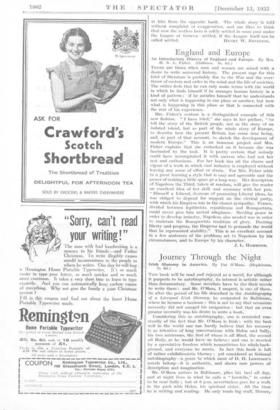England and Europe
An Introductory History of England and Europe. By Mrs. H. A. L. Fisher. (Gollancz. Ss. fkl.) Timan are times when men and women are seized with a desire to -write universal history. The present rage for this kind of literature is probably duc to the War and the over- throw of custom and order in the mind and the life of societies. The writer feels that he can only make terms with the world in which he finds himself if he arranges human history in a
kind of pattern ; - if he satisfies than he understands not only what is happening in one place or another, but how what is happening in this place or that is connected with the rest of his experience.
Mrs. Fisher's venture- is a distinguished example of this new fashion. " I have tried," she says in her preface, " to tell the story of the British people, not as the story of an isolated island, but as part of the whole story of Europe, to describe how the present Britain has come into being, and, as part of that account, to sketch the development of modern Europe." This is an immense project. and Mrs. Fisher explains that she embarked on it because she was fascinated by the task. It is pmt ty certain that nobody could have accomplished it with success who had not her zest and enthusiasm. For her book has all the charm and vigour' of a work in which vast industry is employed without leaving any sense of effort or strain. For Mrs. Fisher adds to a great learning a style that is easy and agreeable and the power of making a little space go a long way. Her description of Napoleon the Third, taken at random, will give the reader an excellent idea of her Skill and economy with her pen. " Himself a Liberal, desirous of promoting Liberal ideas, he was obliged to depend for support on the clerical party, with which his Empress was in the closest sympathy. -France, divided between legitimists, republicans and Bonapartists, could never give -him- united allegiance.- -Needing. peace in order to develop industry, Napoleon also needed war in order to maintain the Bonapartists tradition of glory. Desiring liberty and progress, the Emperor had to persuade the world that he represented stability." This is an excellent account in a few sentences of the problems set to Napoleon by his circumstances, and to Europe by his character.
J. L. HAMMOND.














































 Previous page
Previous page